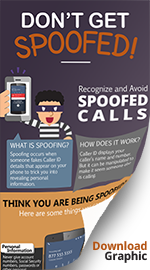An elderly Northern Virginia woman recently received a call from someone identifying himself as Sgt. Michael Jackson from the Fairfax County, Va., sheriff's office. The caller said he wanted to talk to her son.
Shaken by the call, the woman said her son, a man in his 50s, was not at her home but could be reached at his own number, which she then provided.
According to the family, "Sgt. Jackson" then called the son's number and left a voicemail. In it he said the son had failed to show up for grand jury duty and, as a result, a warrant had been issued for his arrest, along with a $1,400 fine.

The caller added that six other people had not shown up for jury duty and he was simply trying to track them all down and sort things out. He then suggested the son could go to a nearby Safeway or CVS to wire the money to a county courthouse account. The son could then report to the courthouse in person and the fine would be refunded there.
County police, upon hearing about this, characterized the call as a familiar scam. In it, scammers claiming to be deputies typically use caller ID spoofing technology to make their calls appear to be coming from an actual police department number.
"The scammers are requesting store gift cards, pre-paid debit cards or money orders for court costs and fines," Fairfax police advised in an alert.
According to the Federal Trade Commission, it is also common for such callers to act as "good guys," suggesting, as in this case, that the issue relates to a mix up of some sort.
Fairfax police stress that you should "never wire money or use preloaded debit/gift cards to pay a fine." And that's true nationwide, according to the National Center for State Courts.
If you receive a similar call, law enforcement agencies advise that you hang up immediately. Do not give out personal information such as your Social Security, bank account or credit card numbers. You should also report the call to law enforcement.
File a complaint with the FCC
Consumers can file complaints online about telecom billing and service issues, unwanted calls, and other matters the FCC oversees. Information about the FCC's informal complaint process, including how to file a complaint, and what happens after a complaint is filed, is available in the FCC Complaint Center FAQ.
